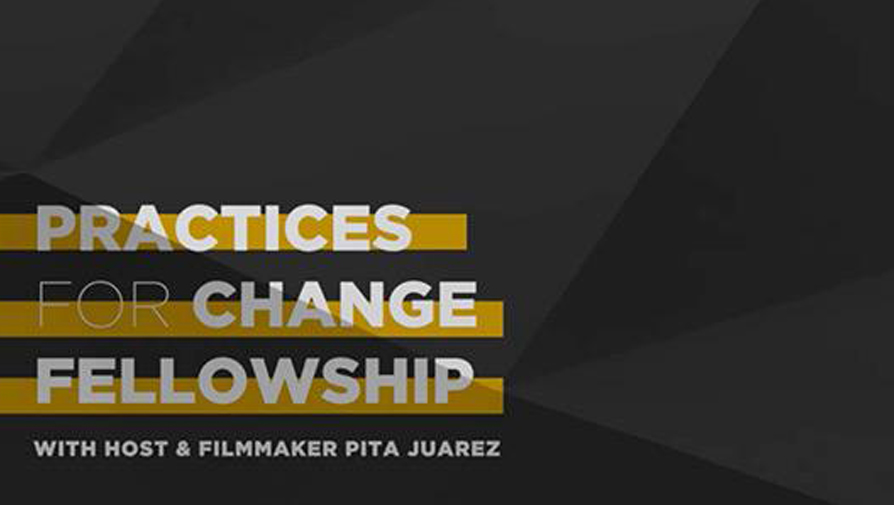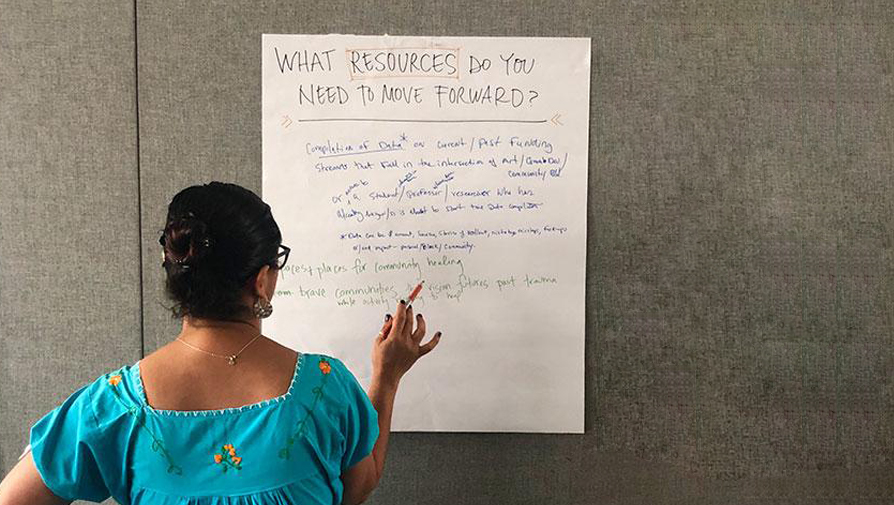
Practices for Change Fellowship
Exploring and implementing arts, culture and design practices
Practices for Change was a fellowship program that supported experienced individuals exploring and implementing arts, culture and design practices within the intersections of equitable community development in non-arts systems, such as justice, housing, planning, public land and health. The goal of this fellowship, which was a program of the National Collaborative for Creative Work, was to support and make visible the critical interstitial work that happens in community systems and creative placemaking in order to expand this field of practice.
2019–2020 Fellows

Pamela Bridgeforth
Philadelphia, Pennsylvania
Pamela Bridgeforth, director of programs for the Philadelphia Association of Community Development Corporations, oversees PACDC’s Member Services programs and launched its Community Development Leadership Institute, which serves as a training and technical assistance umbrella for the association’s 130 organizations and other practitioners working to advance equitable neighborhood revitalization. In addition to leading the creation of two placemaking initiatives (The Third Space Initiative and Art-Powered Places) in collaboration with member organizations, artists, arts organizations and community groups, she convenes learning sessions and workshops on placemaking for the sector and produced a placemaking toolkit featured as part of the 2018 edition of PACDC Magazine: Art, Equity + Place: Creating Neighborhood Health, Happiness, and Well-Being with Art. Prior to joining PACDC, she served as executive director of the Walt Whitman Arts Center. She is an advisor and board member of the Camden Repertory Theatre.
Philadelphia Association of Community Development Corporations

Carrie Ann Christensen
St. Paul, Minnesota
Carrie Christensen’s work in design, planning, education and community engagement falls at the intersection of equity and the environment. With a master’s degree in landscape architecture from the University of Minnesota and a B.A. in urban studies from Stanford University, her cross-sector work combines facilitation, design thinking, community organizing, project management, data analysis, curation, planning and environmental design processes. Christensen is a published author, an adjunct faculty at the University of Minnesota, a 2001 Fulbright Scholar and a 2010 Creative Community Leadership Institute Fellow. She combines facilitation, creative expression and qualitative data methods to bring diverse community voices into planning and design. Christensen is a senior planner at the Minneapolis Park & Recreation Board, where she works on park policy, design and community engagement.
Podcast interview on Engaging through Art
Parks for All engagement with Youth Design Team

Melissa Liu
Brooklyn, New York
Melissa Liu has worked at the intersections of art, culture and education over the past decade and is currently interested in intersecting these areas to support non-profit services for New York’s Chinatown community as program site director with Immigrant Social Services, Inc. Liu has advocated for people of color and immigrants from different class backgrounds and abilities as an administrative worker, organizer and artist through collaborating with groups and networks including Admin, Zines4Equity, Museum Hue and Occupy Wall Street Arts and Labor. Liu’s experience comes from having supported programs, projects and workshops with the Getty Foundation, Hammer and Fowler Museums at UCLA, Columbia University (School of the Arts, Center for Oral History and Business School), College Arts Association, Kelly Street Community Garden in the Bronx, The Laundromat Project, Brooklyn Children’s Museum, CAAAV Organizing Asian Communities and Borough of Manhattan Community College.

Ruby López Harper
Washington, D.C.
Mexican, mother, wife, dancer, photographer, poet and social justice warrior: Ruby López Harper is the director of Local Arts Services for Americans for the Arts. She is the co-chair for the National Coalition on Arts Preparedness and Emergency Response, serves as chair of the Gard Foundation, serves on the board for the Arts and Humanities Council of Montgomery County and serves on the WETA Community Advisory Council. Harper’s work has focused on grantmaking, supporting individual artists, community development, economic development and tourism and public art. She draws on a varied background that includes corporate affairs, marketing and communications and business administration. She served on the Emerging Leaders Council for Americans for the Arts and was the primary contact for the Arts and Economic Impact Study for Central Ohio. She is a 2017 National Association of Latino Arts and Cultures Advocacy Leadership Institute Fellow and Class of 2017 American Express Leadership Academy Alum.

Rukhsana Nezam
Oakland, California
Rukhsana Nezam is a public artist and urban strategist integrating community development, socially-engaged art and urban planning. She works with government entities, grassroots cultural organizations and artists to bring arts and equity into community planning, and has helped developed arts programs at Smart Growth America, PolicyLink and Metropolitan Area Planning Council. As an artist and cultural producer, she uses performance and play in public spaces to disarm and connect. A native of St. Louis, Missouri, she is the founder of St. Louis Improv Anywhere, and involved in many artworks and interventions as an artist and activist after the death of Mike Brown, in Ferguson. Nezam’s research focuses on the racial equity impacts of artist residencies in local government. She holds a master’s degree from Harvard University in art, design and the public domain.
Mallory Rukhsana Nezam's Personal Website
Arts + Planning Toolkit

Tara Mei Smith
New York, New York
Tara Mei Smith is passionate about creating and supporting sustainable and equitable frameworks so that people and places can thrive for generations to come. She has over 12 years of experience working on innovative, catalytic projects. Her background includes work as a womenswear designer and supply chain manager (as part of Proenza Schouler’s CFDA award-winning team and as head designer at Waitex), as a sustainability consultant at Field Guide and as a community planner and environmental stewardship director at Extra Terrestrial Projects. She has organized thought leadership convenings such as Moat Oracle’s inaugural summit on the future of digital attention, Attention.io and The Untokening Durham mobility conference. Recently she worked with a coalition of artists and community members to create a place-based equitable engagement blueprint for all future projects in Durham, NC. Her academic training is in materials chemistry and urban studies at Brown University and fashion design at F.I.T. She is an Audubon Toyota Conservation Innovation Fellow and Next City Vanguard.

Nella Young
Boston, Massachusetts
Nella Young is a senior program director at Enterprise Community Partners, a national nonprofit in housing and community development. With a background in experiential education and asset-based planning, Young is interested in how creative expression can be harnessed as a force for greater social cohesion, resilience and equity. Young is a champion for the integration of culture and creativity into community development and is responsible for launching two influential grant programs at Enterprise: Collaborative Actions and Climate and Cultural Resilience. She is part of Enterprise’s efforts to take an increasingly holistic, place-based approach to community development that puts residents, and their culture, at the center. Young holds a master’s degree in urban and environmental policy and planning from Tufts University and a bachelor’s degree from Wesleyan University, where she majored in studio arts.
Rose Fellowship Program
Webinar about Arts Position with Rose Fellowship
Podcast
Thoughts on Power, Transformation and Self-Determination in Creative Placemaking
The Practices for Change podcast is a multi-part conversation about how the fellows leverage their power and intentionally transform ideas of place at the intersection of creativity and community development. They address the complexities of identity, narrative, power, and discuss how they navigate racially equitable practices within their institutions and places of work.
- Episode 1: Leveraging Power and Self-Determination Amidst Institutional Spaces
- Episode 2: Leveraging Power and Self-Determination Amidst Institutional Spaces
- Episode 3: Transforming Place and Intentionality of Community Development
- Episode 4: Transforming Place and Intentionality of Community Development

Impact
Piloted in 2019-2020, the Practices for Change fellowship for seven artists and culture workers employed at the intersection of policy, transportation, infrastructure, immigration, public land, community development and community placekeeping. This fellowship was funded by the National Endowment for the Arts, in program collaboration with Center for Performance and Civic Practice, and focused on the goal of supporting and making visible the critical interstitial work that happens in community systems and creative placemaking in order to expand this field of practice. Amidst a tumultuous year of deep conversations about racial equity, and the rise of the global pandemic, this pilot program aimed to support fellows’ in research collaborations, focused development time, coaching, and peer to peer connections helped seed and germinate policies and plans to guide more equitable and intentionally considered communities in their respective areas.
Collaborations and responses to COVID-19
During the fellowship, Tara Mei Smith was able to develop and prototype her time travel place-knowing workshop which has now been implemented in community groups and cities across the country. The workshop was featured in collaboration with Carrie Ann Christensen at the National Consortium for Creative Placemaking Leadership Summit in late 2019 and recently with the Albuquerque Public Art program in efforts to guide public art finalists in a deeper practice of designing with attention to the history and sense-knowledge of a place.
Continued relationships and research collaboration blossomed for Mallory Ruhksana Nezam who recently launched an artist support network in collaboration with Amanda Lovelee and ASU Professor, Johanna Taylor called CAIR (Civic Artists in Residence) Lab. CAIR Lab supports artists-in-residence in government through research, public speaking and launching new programs in collaboration with government staff, artists, and communities.
Nazam and Taylor recently published a collaboratively-written guide to advancing racial equity in government facilitated artist residencies. The article can be found on the International City/County Management Association website.
Along with facilitating a program which places artists in municipal artist residencies, Nella Young, also initiated conversations with institutional field leaders for thoughtful responses to the pandemic centered around resilience and healing and the role of cultural activation within the Enterprise Community Development network. Read her thoughts on cultural resilience lessons during COVID-19 and beyond and on healing-centered community engagement.

photo credit: Katie Ann Franklin

Resources
Resources for designing a fellowship program
- Overview and eligibility
- Announcement
- Selection questions and rubric
- Announcement of Fellows
- Sample orientation model and program timeline
Other resources to support creative placemaking work

Who's involved
Partners and advisors
- Shannon Scroffono, Center for Performance and Civic Practice
- Rebecca Mwase, Desired Evolutions
- National Endowment for the Arts Our Town Grant